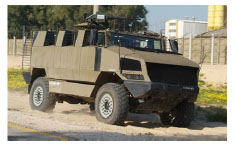Golan, a new wheeled armored vehicle developed in Israel by RAFAEL was unveiled in 2006. Responding to the need for wheeled armored vehicles for use in asymmetric warfare, RAFAEL developed the Zeev (Wolf) armored utility vehicle. More recently, RAFAEL teamed with US based PVI and the Merkava program Office (Mantak), to develop the Golan Heavy Wheeled Armored vehicle. Golan has been proposed for the IDF and USMC. Testing of the vehicle began in September 2006. In January 2007 Golan was selected, along with nine other candidates, to compete for the Joint US Marines/NavyArmy Mine Resistant Ambush Protected (MRAP) Program. PVI is leading the team for the MRAP opportunity while RAFAEL is in the lead for Israeli and other overseas sales. On February 23, 2007 the USMC awarded PVI a first order for 60 low rate initial production vehicles, representing the first order for Golan vehicles.
The 15 ton vehicle is designed to carry 10 fully equipped troops, providing effective protection from small arms, mines and IEDs, as well as RPG threats.
Several months ago, the Marines sought to buy 4,000 armored vehicles, and published a request for proposals for a vehicle capable of meeting the threats faced by forces in the field.
Rafael said that the contract was an extraordinary achievement for Israel's defense industry in general and for Rafael in particular, especially given the competition and protection specifications made by the Marines. The company said it hoped that the Golan would soon enter service with the IDF.
$110m to set up Kiryat Shmona "Biotech Park"
The project will be presented to investors, entrepreneurs and the Ministries of Industry and Science and Technology during a conference to be held in Kiryat Shmona in June. The project's planners believe that a Biotech Valley industrial park will be set up with an initial 20 start-ups, half of which will be in the development stage, and at least one large anchor company. Teva Pharmaceutical Industries Ltd. (Nasdaq: TEVA; TASE: TEVA) already has a facility at Tel Hai College.
These companies can potentially raise $250 million, and are expected to employ 250-300 people. The project planners say that the industrial park will leverage other business activity in the area. Each high-tech job generates an estimated 2.5 jobs in other sectors.
Meytav Technological Incubator CEO Zvika Rubinstein said, "Academic-industrial cooperation and the provision of infrastructures and services at a super-incubator level will turn Kiryat Shmona into a center of gravity for Israeli companies and foreign investors. Meytav's experience has taught us that a concentration of infrastructures, human capital, and advanced services will bring private investors to the Galilee. We believe that there's a need for government support to drive the idea forward, but most of the subsequent financing will probably come from private sources."
 The US Marine Corps has selected the Golan multi-purpose modular armored vehicle made by Rafael Armament Development Authority Ltd. and PVI of the US for use in Iraq and Afghanistan. The Marines will initially buy 60 Golans for $37 million.
The US Marine Corps has selected the Golan multi-purpose modular armored vehicle made by Rafael Armament Development Authority Ltd. and PVI of the US for use in Iraq and Afghanistan. The Marines will initially buy 60 Golans for $37 million.
The Ministry for the Development of the Negev and Galilee and the Ministry of Industry, Trade and Labor together with the United Joint Israel Appeal (UJIA), the United Israel Appeals Federations Canada , Sacta Rashi Foundation, the Jewish Colonization Association, and the Jewish Agency are due to invest $110 million in establishing "Biotech Valley" near Tel Hai College. "Globes" broke the storey about the joint venture between the college, Meytav Technological Enterprises Innovation Center Ltd. in Kiryat Shmona, and the MIGAL - Galilee Technology Center, which is intended to attract top-quality biomedical researchers to live and work in the Upper Galilee.